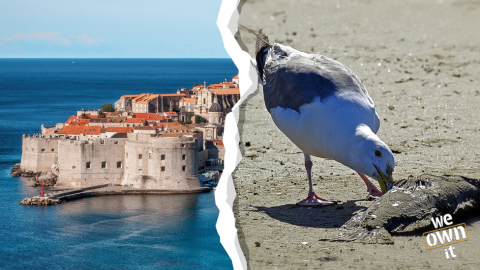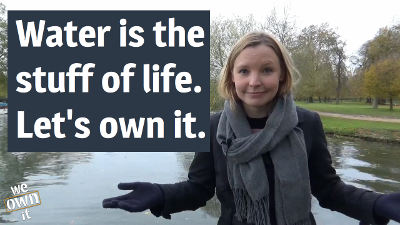
7 August 2024
“Not a single privatised water utility comes even close to their performance,” Professor Asit Biswas, water expert and winner of the Stockholm Water Prize, told the Financial Times.
According to the story from FT’s Infrastructure Correspondent Gill Plimmer, the world’s leading water companies are indeed in public hands, with private competitors lagging behind.
In fact, 9 in 10 water companies are publicly owned, even in places like the United States. England and Wales are unique in their experiment with full privatisation.
How do we compare with our nearest neighbours for delivering clean rivers and seas?
Public ownership delivers Europe’s cleanest water.
Every year, the European Environment Agency releases information about the quality of each country’s bathing water sites — the cleanest sites are given an ‘excellent’ rating.
Over the last six years, there has been a clear pattern: the countries with the cleanest rivers and seas have publicly owned water companies.
Only 7 countries have an average (2018-2023) of 90% or more bathing sites achieving ‘excellent’ status — and they are all over 90% publicly owned.
- Cyprus — 97.7% excellent water, 100% publicly owned. Water services are generally provided by public Water and Sewage Boards. Areas without Boards are either run by councils or communities.
- Austria — 97.5% excellent water, 100% publicly owned. In Austria, not only are wastewater services carried out directly by councils or publicly owned companies, water privatisation has been banned by the constitution.
- Greece — 96.2% excellent water, 99% publicly owned. Greece has over 142 council owned ‘DEYA’ water companies and a negligible account of direct provision by councils, but two large companies serve Athens and Thessaloniki (2/144). These large companies are publicly owned and controlled but minority stakes are privately owned. The Highest Greek Court has recently prevented further privatisation, deeming it unconstitutional. While Greek sewage management had received some criticism, significant steps were taken to expand treatment capacity.
- Malta — 95.9% excellent water, 100% publicly owned. All services are provided by the publicly owned utility company — the Water Services Corporation.
- Croatia — 95.6% excellent water, 95% publicly owned. EurEau, the pan-European water regulator association, found that the majority of water services are directly provided by local government, noting only one wastewater plant in the City of Zagreb that is under a private concession. While water services may fall to lower levels of local government, the City of Zagreb is just 1 of 21 counties in Croatia, putting the level of privatisation under 5 percent.
- Germany — 91.2% excellent water, 92% publicly owned. Germany has had several notable experiments with drinking water privatisation — which is still around 15% privatised, 21% public-private partnership — but wastewater has remained in public hands. Germany has also seen a large-scale reversal of water privatisation, with several notable returns to public ownership.
- Denmark — 91.2% excellent water, 100% publicly owned. While Denmark has recently reformed drinking water services to introduce a large consumer-owned or cooperative sector, corporate private ownership does not feature and all 110 wastewater companies are publicly owned.
In contrast, the UK has an average of 66.3% excellent bathing water, putting it firmly at the bottom of the European league table, only just beating Hungary, Estonia, Slovakia, Poland and Albania.
Why would public ownership tend to work better?
- It’s cheaper to invest. As Plimmer’s piece points out, public utilities “borrow money at lower interest rates than private companies.” Thames Water debts run up to 8.25% interest rate against a public sector debt rate 2.5 times lower. Not only can that mean cheaper bills, but it also means increasing investment in spills prevention costs less.
- It’s less wasteful. The equivalent of one month’s water bill goes straight out as dividends to shareholders in England. Public ownership allows profits to be reinvested.
- It brings stability. England’s water companies are in constant financial distress due to £68bn in debts accumulated mainly to pay dividends. Instability has left raising capital to keep themselves solvent is a challenge, let alone to prevent sewage spills.
Ownership gives you the control that renting can’t (in public services as well as owning a home) — but you still have to use your new found power.
As the Financial Times points out, some poor performers are in public hands too. But as expert Professor Biswas says, no private operator come close to the best public utilities.
Only public ownership gives a country the power it needs to tackle the scandal of sewage, but it doesn’t mean that it will.
In rented accommodation you can barely guarantee your landlord will fix the roof, let alone paint the walls or insulate to keep your bills down. Home ownership gives you that power — but you still have to choose to make it happen. It’s the same with our country’s key public services like water.
We propose learning the lessons from freshly public water companies in France and Spain.
Instead of leaving politicians to oversee all the decision making by new water companies in Paris, Grenoble, and Terressa have put bill payers, civil society, worker, and water experts on the company boards. We propose a similar approach could help Thames Water.
Similarly, lessons from Croatia show that public ownership allows you to make clean water a priority, something the Scottish government should be noting.
Could it happen here?
Public ownership is incredibly popular in the UK: 8 in 10 back the plan.
The government can use existing powers to transfer failing water companies into public ownership, with shareholders receiving very little or even nothing in compensation, starting with Thames Water.
Debts accumulated under privatisation could be wiped out or significantly cut, unlocking billions to invest in new infrastructure.
Agree? Add your name below to our petition! You can find out more about our water HERE.



Comments
Nicholas Palmer replied on Permalink
Water belongs to the people
Add new comment